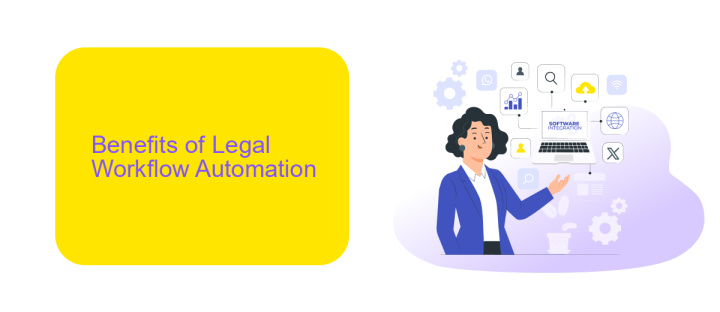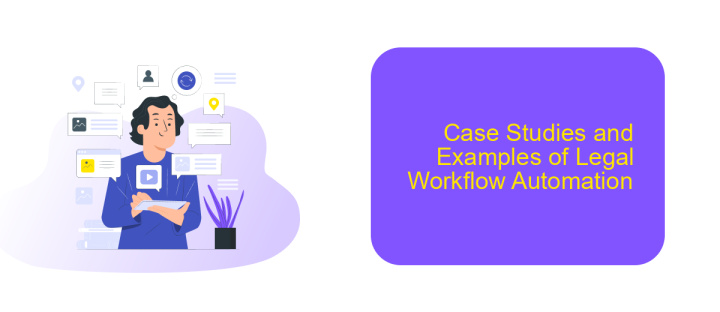Legal Workflow Automation
In today's fast-paced legal environment, efficiency and accuracy are paramount. Legal workflow automation leverages technology to streamline routine tasks, reduce human error, and enhance productivity. By automating document management, case tracking, and client communication, law firms can focus more on strategic legal work and less on administrative burdens, ultimately providing better service to their clients.
Introduction to Legal Workflow Automation
Legal workflow automation is transforming the way legal professionals manage their tasks and processes. By leveraging technology, law firms and legal departments can streamline their workflows, enhance efficiency, and reduce the risk of human error. This approach not only saves time but also allows legal teams to focus on more strategic activities.
- Automated document generation and management
- Task assignment and tracking
- Client communication and follow-ups
- Compliance and risk management
- Integration with other legal tech tools and services
One of the key components of successful legal workflow automation is the integration of various tools and services. Platforms like ApiX-Drive facilitate seamless integration, enabling legal professionals to connect different software applications and automate data transfer between them. By utilizing such services, legal teams can ensure a more cohesive and efficient workflow, ultimately improving their overall productivity and client satisfaction.
Benefits of Legal Workflow Automation

Legal workflow automation offers numerous benefits that significantly enhance the efficiency and productivity of legal professionals. By automating repetitive tasks such as document generation, case management, and client communications, law firms can save valuable time and reduce the risk of human error. This allows legal teams to focus on more complex and strategic activities, ultimately improving the quality of legal services provided to clients. Additionally, automation ensures that all processes are standardized and compliant with regulatory requirements, which is crucial for maintaining the integrity and reliability of legal operations.
Another key advantage of legal workflow automation is the seamless integration with other tools and systems. Services like ApiX-Drive facilitate the easy connection of various applications, enabling law firms to create a cohesive and interconnected workflow. This integration capability allows for real-time data synchronization and improved collaboration among team members, leading to faster decision-making and enhanced client satisfaction. Furthermore, automated workflows can provide valuable insights through analytics and reporting, helping firms to continuously optimize their processes and achieve better outcomes.
Challenges of Legal Workflow Automation

Legal workflow automation presents a variety of challenges that firms must navigate to achieve optimal efficiency. One of the primary issues is the integration of new automated systems with existing legacy systems, which can be complex and costly.
- Data Security and Privacy: Ensuring that sensitive legal information remains secure is paramount. Automation tools must comply with stringent data protection regulations.
- Complexity of Legal Processes: Legal workflows often involve intricate, non-standardized processes that are difficult to automate effectively.
- Resistance to Change: Lawyers and staff may be resistant to adopting new technologies, preferring traditional methods.
- Integration Challenges: Seamlessly integrating automation tools like ApiX-Drive with existing software systems can be challenging and may require significant technical expertise.
- Cost and Resource Allocation: The initial investment in automation technology and the ongoing need for maintenance and updates can strain financial and human resources.
Despite these challenges, the benefits of legal workflow automation, such as increased efficiency and reduced human error, make it a worthwhile investment. Utilizing services like ApiX-Drive can simplify the integration process, allowing firms to better manage their automated workflows and enhance overall productivity.
Case Studies and Examples of Legal Workflow Automation

Legal workflow automation has revolutionized the way law firms and legal departments operate, streamlining processes and enhancing efficiency. One notable case study involves a mid-sized law firm that implemented a comprehensive automation solution to manage client intake, document generation, and case management. The result was a 40% reduction in administrative tasks, allowing lawyers to focus more on client interactions and case strategy.
Another example is a corporate legal department that integrated automation tools to handle compliance checks and contract reviews. By using platforms like ApiX-Drive, they were able to automate data transfers between various legal software, ensuring real-time updates and reducing the risk of human error. This led to a 30% increase in compliance accuracy and faster contract turnaround times.
- Client intake and onboarding automation
- Document generation and management
- Compliance checks and contract reviews
- Data integration using ApiX-Drive
These case studies highlight the tangible benefits of legal workflow automation, demonstrating how technology can optimize operations and improve service delivery. By leveraging tools like ApiX-Drive for seamless integration, legal professionals can achieve greater efficiency and accuracy in their daily tasks.
Future of Legal Workflow Automation
The future of legal workflow automation is poised to revolutionize the legal industry by leveraging advanced technologies such as artificial intelligence, machine learning, and blockchain. These innovations will enable law firms to streamline their processes, reduce human error, and enhance productivity. For instance, AI-powered tools can automate document review and contract analysis, allowing legal professionals to focus on more strategic tasks. Additionally, blockchain technology can ensure the integrity and security of legal documents, making transactions more transparent and trustworthy.
Integration platforms like ApiX-Drive will play a crucial role in the evolution of legal workflow automation. By offering seamless integration with various legal software and tools, ApiX-Drive helps law firms to create a more cohesive and efficient workflow. This integration capability allows for the automation of repetitive tasks, such as data entry and client communication, thereby reducing administrative burdens and improving overall efficiency. As these technologies continue to advance, the legal industry will witness unprecedented levels of innovation and efficiency, ultimately transforming the way legal services are delivered.


FAQ
What is Legal Workflow Automation?
How can Legal Workflow Automation benefit my law firm?
What types of tasks can be automated in a legal workflow?
How do I start implementing Legal Workflow Automation in my firm?
Is Legal Workflow Automation secure?
Apix-Drive is a simple and efficient system connector that will help you automate routine tasks and optimize business processes. You can save time and money, direct these resources to more important purposes. Test ApiX-Drive and make sure that this tool will relieve your employees and after 5 minutes of settings your business will start working faster.

